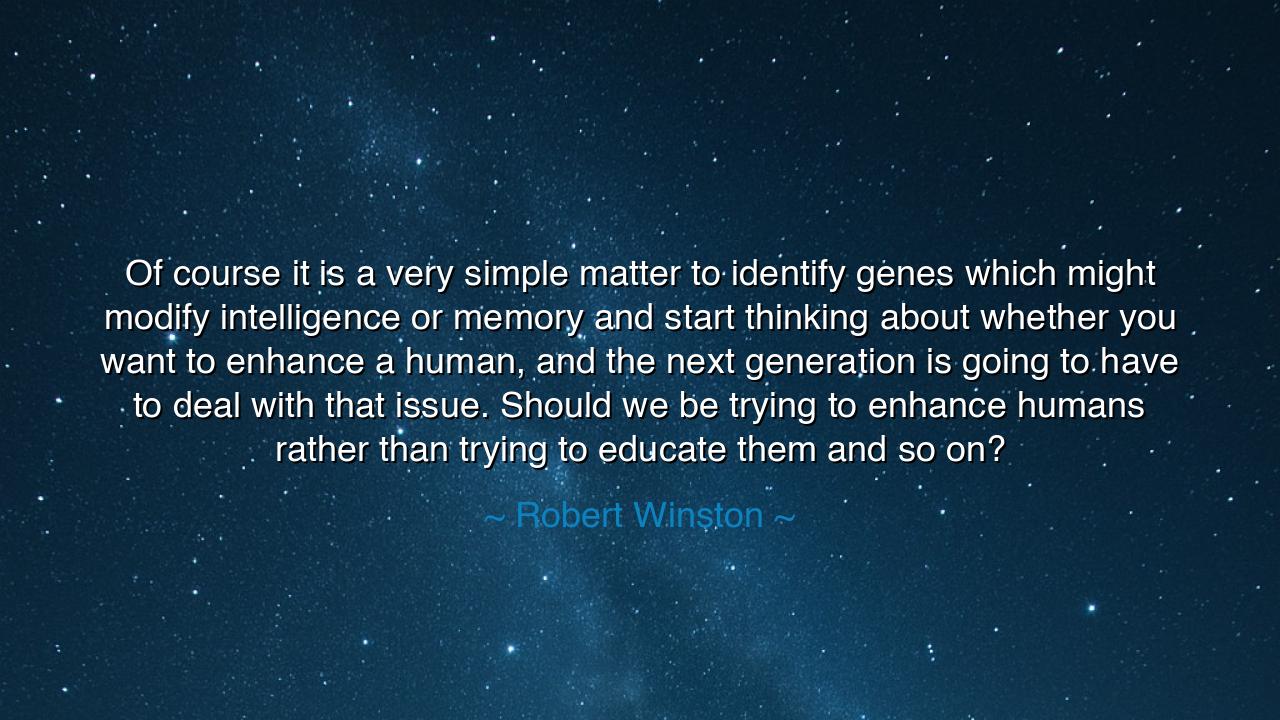
Of course it is a very simple matter to identify genes which
Of course it is a very simple matter to identify genes which might modify intelligence or memory and start thinking about whether you want to enhance a human, and the next generation is going to have to deal with that issue. Should we be trying to enhance humans rather than trying to educate them and so on?






The words of Robert Winston, physician, scientist, and sage of modern ethics, fall upon the ear like both prophecy and warning: “Of course it is a very simple matter to identify genes which might modify intelligence or memory and start thinking about whether you want to enhance a human, and the next generation is going to have to deal with that issue. Should we be trying to enhance humans rather than trying to educate them and so on?” In this reflection, he does not speak merely of science, but of the eternal crossroad between power and wisdom, between the urge to improve nature and the responsibility to understand it. His question is not technical—it is moral. He asks not if we can alter the human mind, but whether we should. And in that question lies the soul of an age standing at the brink of godlike ability and ancient folly.
Robert Winston, a pioneer in fertility and genetics, has long stood as a voice of reason in the age of miracles. His words arose in a time when science began to unravel the secrets of the human genome, revealing the blueprints of life itself. The ancient dream of shaping man in his own vision—once the work of gods, artists, and philosophers—had now passed into the hands of the geneticist. To “enhance” humanity, to alter intelligence, memory, and character at the level of DNA, no longer belonged to the realm of myth. Yet Winston, in his wisdom, reminds us that power without reflection becomes peril, and progress without ethics becomes destruction. His tone carries both awe and caution, as though he stands before a sacred fire that can either illuminate the world or consume it.
Throughout history, mankind has sought to transcend his limits. The Greeks told of Prometheus, who stole fire from the gods to give to man, and was punished for his daring. In that story lives the eternal tension between creation and hubris, between the desire to improve and the wisdom to restrain. In our age, the “fire” is genetic power. To modify intelligence or memory is to touch the essence of the human spirit, to reach into the architecture of consciousness itself. But what Winston asks us to consider is profound: if we perfect the human form through science, do we also perfect the human soul? Can we engineer compassion, humility, or wisdom—the very qualities that make intelligence meaningful?
It is here that the contrast between enhancement and education becomes the heart of his message. To educate is to cultivate the mind through effort, curiosity, and discipline. It is a slow unfolding, a sacred dialogue between the self and the world. To enhance, by contrast, is to replace struggle with manipulation—to grant ability without growth, brilliance without understanding. Winston warns that if we choose enhancement over education, we may create beings who are sharper, faster, stronger—but not wiser. For wisdom cannot be spliced into the genome; it is born from the friction of living, from error, from empathy, from the patient shaping of the human experience.
Consider the tale of Dr. Frankenstein, that modern Prometheus who, in his thirst for knowledge, created life only to be haunted by it. His creature, made of brilliance but devoid of belonging, mirrored his maker’s lack of humility. The tragedy of Frankenstein is not in his failure of science, but in his failure of ethics—his blindness to the spiritual consequences of his invention. So too must we heed Winston’s warning. To create a generation that is engineered for intellect without understanding, or strength without compassion, is to risk birthing a civilization that forgets its humanity in its pursuit of perfection.
Winston’s question, then, is not a condemnation of progress but a call to balance. Science, he implies, must walk hand in hand with morality, as the mind must walk with the heart. The next generation, he says, must decide whether to build a world where human greatness is measured by genetic design or by the richness of the soul’s education. The choice will define the very meaning of what it is to be human. For if we forget the value of learning, of curiosity, of the noble struggle toward understanding, we may find ourselves living in a world of engineered minds—but impoverished spirits.
Therefore, O seeker of truth, take this teaching to heart: pursue knowledge, but revere wisdom. Let science be your servant, not your master. Seek to improve humanity not through alteration, but through education, empathy, and enlightenment. The truest enhancement of mankind does not come from changing the code of our flesh, but from elevating the code of our conscience. For genes may shape the vessel, but education shapes the voyager.
And so, as Winston reminds us, the question is not whether we can change what we are—but whether we will still know why we should. Let the next generation, and each of us within it, remember: the mind is a gift to be cultivated, not rewritten; the soul, a mystery to be understood, not engineered. Enhance humanity not by redesigning it, but by awakening it. Only then will progress be not a threat, but a triumph worthy of our highest calling.






AAdministratorAdministrator
Welcome, honored guests. Please leave a comment, we will respond soon